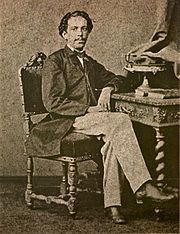
Arquivo para March 28th, 2016
Machado de Assis and brazilian politic
Borrowed by a friend started reading the Dust of glory: one (unexpected) history of Brazilian literature, in portuguese: A poeira da glória: uma (inesperada) história da literatura brasileira, Martim Vasques da Cunha (Rio de Janeiro: Record, 2015), which is an attempt to revisit more than the national literature, peer into the Brazilian soul.
history of Brazilian literature, in portuguese: A poeira da glória: uma (inesperada) história da literatura brasileira, Martim Vasques da Cunha (Rio de Janeiro: Record, 2015), which is an attempt to revisit more than the national literature, peer into the Brazilian soul.
Of course it could not be present Machado de Assis, born on 21 June 1839 in Rio de Janeiro, then capital of the Empire of Brazil (brazilian royalistit), highlight here according to the author the work of his maturity Esau and Jacob (1904) to have would be called the last, despite the author “seem to believe that is the lack of direction the who commands the things of this world “(Cunha, 2015, p. 32), typical of the nihilism of the early twentieth century, and the crisis is at the time.
Take the conflict (or conflicts) in the Brazilian soul present in the “poor” Flora “soul torn between two rival twins – the royalist Peter and Paul Republican, symmetrical in relation to the two apostles and two Hebrew patriarchs. Not knowing who and what should be chosen, it loses its vital forces and died in the prime of youth … “(ibid).
It is curious da Cunha Vasques analysis, as a rereading of Esau and Jacob, says wedge that is a kind of “abandonment ontology” with a “dangerous skepticism about the mechanisms of politics” (idem) and in this context its a figure that is a kind of alter ego of Machado de Assis, the Counselor Aires, which will become clearer in the Memorial Aires, this rather the “last” Machado de Assis’s novel.
so reports Cunha “Aires wants to be embodied tolerance, but all it does is to relativize things, is what is good is what is bad, just not to attack the sensitivity of others. “(Cunha, 2015, p. 33), which seems to be the speech of the current tolerance, sometimes balls, democracy becomes manifesting this is normal, just and right politically, of course within a rational and democratic normality allow this to everyone.
The critical author Machado de Assis explains in Memorial de Aires, that changing the name of “Confectionery Empire” to “Confectionery of the Republic,” replacing the name that he was “rotten inside” in a novel that gives a enormous weight to the names, typical of symbolism Aires hesitates and does not know what to say, then say it might be better to write “Confectionery Osório,” a sort of “guardian of the Brazilian people. “.
Wilson Martins is intertwined with the Axe opinion of Assisi, who seemed criicar, saying “the proclamation of the Republic, far from the profound social transformation and affirmed by political propagandists and revolutionaries … it was just a change of tablet – confectionery still the same. “. (Cunha, 2015, p. 33)

